13 oct 2012
OIC calls for repairing and building houses of poor people in Gaza
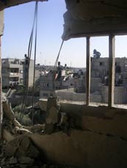
The Organization of Islamic Cooperation (OIC) called on its member states and their humanitarian organizations to repair and rehabilitate the houses of the poor citizens of the Gaza Strip.
This appeal came in the monthly report issued by the Organization about the humanitarian situation in the Gaza Strip, which focused on the suffering of poor people in the Strip who are living in almost ramshackle houses or in single room homes with cracked walls, while expecting the aggravation of their suffering with the advent of the winter season.
According to the organization's report, about 71% of the families of the Gaza Strip need residential units, and 23% of them are living in extreme poverty and cannot improve their living conditions.
The report also mentioned that after field visits conducted by the team of field survey operating for the OIC, it found out that there is a need to repair 2400 houses of poor people by adding facilities and improvements, and to demolish and re-construct 500 uninhabitable housing units.
This appeal came in the monthly report issued by the Organization about the humanitarian situation in the Gaza Strip, which focused on the suffering of poor people in the Strip who are living in almost ramshackle houses or in single room homes with cracked walls, while expecting the aggravation of their suffering with the advent of the winter season.
According to the organization's report, about 71% of the families of the Gaza Strip need residential units, and 23% of them are living in extreme poverty and cannot improve their living conditions.
The report also mentioned that after field visits conducted by the team of field survey operating for the OIC, it found out that there is a need to repair 2400 houses of poor people by adding facilities and improvements, and to demolish and re-construct 500 uninhabitable housing units.
9 oct 2012
Boycott committee: Palestinian “Rawabi” tycoon Bashar Masri “must end all normalization activities with Israel”
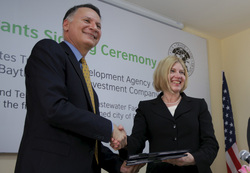
Bashar Masri with Leocadia Zak, Acting Director of the United States Trade Development Agency, after signing an agreement at Rawabi, March 2010
The Palestinian Boycott Divestment and Sanctions National Committee, the steering group of the boycott, divestment and sanctions (BDS) campaign issued the following statement today condemning the “normalization” activities of Palestinian-American tycoon Bashar Masri whom it accused of advancing “personal interests and profit making at the expense of Palestinian rights.”
Masri is renowned as the developer of “Rawabi,” a Qatari-financed luxury housing development built on West Bank land confiscated from three Palestinian villages by the Palestinian Authority and handed over to Masri’s private firm. The Electronic Intifada has previously reported on some of Masri’s activities in relation to Rawabi.
Palestinian civil society denounces Bashar Masri’s normalization with Israel as undermining the struggle for Palestinian rights Occupied Palestine, 10 September 2012 – The Palestinian Boycott, Divestment and Sanctions National Committee (BNC), the largest coalition in Palestinian civil society that includes Palestinian political parties, unions, NGOs and grassroots organisations and leads the global BDS movement, strongly condemns the participation of Palestinian businessman Bashar Masri in the Israeli High Tech Industry Association (HTIA) annual conference taking place between the 10th and 12th of September in Haifa and Jerusalem.
Other speakers to the conference include Israel’s Prime Minister Benjamin Netanyahu and Nir Barakat, the Israeli mayor of occupied Jerusalem. Masri will be speaking at a panel with Israeli businessman in a conference that is supported by the Israeli Ministry of Foreign Affairs, among other Israeli state bodies. Masri’s participation in this conference constitutes an act of normalization with Israel that helps it whitewash its ongoing occupation, colonization and apartheid against the Palestinian people and that undermines the Palestinian struggle for freedom, justice and self determination.
The institutions and individuals at the helm of this propaganda conference that aims to promote Israel to the world as a “high-tech haven” are active participants in the oppression of Palestinians and persistent violators of international law. Israel’s high-tech industry is a major partner of the Israeli military-security complex and depends on it for its growth and success. Exports from the Israeli high-tech industry help sustain the military budget. It is therefore unsurprising that the conference enjoys the full backing of Israel’s ruling elite with the high-tech industry accounting for one-third of Israel’s GDP and constituting a key pillar to Israel’s hegemony in the region.
The symbiotic relationship between Israel’s high-tech industry and military complex is built in part on the back of Palestinians since Israel uses its military occupation of the West Bank and the Gaza Strip to battle-test, or field-test, its technological advances and invest that in promoting its international military sales. In one such instance, Amnesty International found evidence of victims dying of unusual wounds during Israel’s 2008/9 assault on Gaza due to use of unspecified new weapons. This practice provides the starkest example of Israel profiting directly from the lives of Palestinians, which Israel makes no secret in considering dispensable and of inferior value. All this has led the BNC to call for a comprehensive military embargo on Israel, including on high-tech companies that are complicit in its violations of international law.
“Shameless act of normalization of the worst type” Masri’s support for this conference despite the public nature of these facts constitutes a shameless act of normalization of the worst type that trivializes the sacrifice of those Palestinians that on a daily basis struggle to defend their rights and dignity. These include the Palestinian prisoners currently risking their lives on hunger strike in Israeli jails and Jerusalemites who are facing a vicious and escalating Israeli campaign of ethnic cleansing advanced by the apartheid Jerusalem Municipality of Nir Barakat.
To make matters worse, this year’s HTIA conference will commemorate the centennial of Israel’s Technion University, an institution that plays an active role in the dispossession of Palestinians. To cite just one example among many, Technion has led in the development of the armoured Caterpillar-manufactured D9 remote-controlled bulldozer used by the Israeli military to demolish Palestinian houses. Technion is target of an international boycott called for by Palestinian academics and international solidarity groups in Canada and the US, among other countries. It is disconcerting to see a Palestinian breaking the boycott, as Masri is deliberately doing, when hundreds of academics worldwide have adhered to it as an act of principled solidarity and have even put their careers on the line to stand up to its detractors.
Actions “in harmony” with Israeli policy Bashar Masri’s commitment to this conference is not out of line with his other dealings with Israel in subversion of the Palestinian-led global BDS campaign to isolate Israel, an effort that has enjoyed unprecedented success worldwide and constitutes one of the most effective tools Palestinians have for accountability and justice in the face of growing Israeli criminality and impunity. Contrary to Masri’s claims to be working for “building Palestine” through his business dealings, his actions have in fact been more in harmony with Israel’s declared policy of “economic peace” for the West Bank, that is, the sidelining of basic Palestinian rights, including the right to self determination of all Palestinians, in favour of economic gains for an elite minority, part of Israel’s carrot and stick approach that rewards obedience to Israeli dictates. The failure of this policy, spearheaded by Netanyahu, has manifested itself in the abject poverty, growing malnutrition, and joblessness that have prevailed among Palestinians in the occupied Palestinian territory, particularly in the besieged Gaza Strip and the so-called Area C of the West Bank, controlled by Israel.
Bashar al-Masri has been an active supporter and participant in the Israeli-Palestinian Chamber of Commerce (IPCC), an Israeli-established and controlled body based in Tel Aviv designed to advance the economic exploitation of Palestinians and Palestinian resources under occupation. One of the stated goals of the IPCC is to provide business intelligence and facilitate deals for Israeli businessmen in the Palestinian market. The organization is headed by Israeli Lt. Col (ret) Avi Nudelman, an Israeli military official who spent most of his career in the intelligence apparatus or as a high-level commander for the Israeli military. Masri participated in the opening gala of the IPCC and lectured before its [Israeli] members at least once about the prospects of investing in the Palestinian economy. According to Masri himself, “Israeli businessmen come to me time and time again seeking help in entering the Palestinian market and the Arab world.”
Rawabi The BNC had publicly condemned this blatant economic normalization, in particular through the construction of the planned city of Rawabi, north of Ramallah, as news became known that Israeli companies were “invited” to bid for contracts. More recently, Masri was quoted as warmly inviting Israelis themselves to “buy apartments” in Rawabi. Indeed, in 2009 there was outrage when Bayti Real Estate, which Masri jointly owns with the Qatari Diar group, had accepted a donation of trees for Rawabi from the Jewish National Fund (JNF), the Zionist entity that “pioneered” the ethnic cleansing of Palestinians since before the 1948 Nakba and is now involved in an effort to displace thousands of Palestinian citizens of Israel from the Naqab. The trees had remained in place months after Masri had committed to replace them in response to public pressure.
To conceive Rawabi, Masri sought the services of Israeli architect Moshe Safdie, who reportedly took Masri on a tour of one of his projects, the planned city of Modi’in. Part of the Modi’in complex is in fact a West Bank settlement, Modi’in Illit, illegally built on the lands of the village of Bil’in for which weekly protests are organized at the cost of violent Israeli repression. Safdie, who is a main architect of an illegal Jewish settlement in the Old City of Jerusalem, has also conceived the design for the Mamilla Mall in the eastern part of occupied Jerusalem and owns a house built over property belonging to Palestinians as a settler in the Old City.
Hired Ariel Sharon’s former advisor Masri was in the news last year as a bidder for the financially troubled illegal Israeli settlement of Nof Zion, built in the middle of the Palestinian neighborhood of Jabal Mukabber in the eastern part of occupied Jerusalem. For both of these endeavors, Rawabi and Nof Zion, Masri hired the services of his counterpart, businessman Dov Weisglass, Ariel Sharon’s former advisor, widely quoted for his summing up of Israel’s siege of Gaza. Weisglass said, “ ‘the idea is to put the Palestinians on a diet, but not to make them die of hunger.” This policy has been confirmed in practice through a court petition whereby Israel counted minimum calories each Palestinian in Gaza was entitled to. That Masri would partner with someone accused of complicity in war crimes against the Palestinian people to forward his business interests is inexcusable.
More recently Masri entered into partnership with Maurice Levy, the French Zionist owner of the multinational advertising corporation Publicis. Levy purchased a stake at Masri’s firm – Zoom Advertising – and acquired at the same time the Israeli ad agency BBR group, in effect merging the two. With this move, Levy declared his intention of building peace “through strong economies.”
As is typical in the discourse of so-called “liberal Zionists,” Levy never mentioned Palestinian rights or Israel’s role in denying them. One of Levy’s “peace” projects includes a partnership with the Peres Center for Peace to get Israelis and Palestinians to donate blood to each other, presumably to bring both sides closer together, a particularly detestable idea given Israeli apartheid policies and the scope of Israel’s killing and injuring of Palestinians on a daily basis.
Participated in Israeli “Presidential Conference” Last June, Masri participated as a speaker in the Israeli Presidential Conference, an event “inspired by the vision of the President of the State of Israel Shimon Peres.” This “vision” could have been the development of Israel’s nuclear weapons program for which Peres is credited or the Qana massacre in 1996 that killed 102 Lebanese civilians seeking refuge at a UN building. Peres is one of Israel’s “demographic threat” soothsayers, warning against the threat of Palestinian babies to the Jewish character of Israel. Despite this, Masri is known to maintain open relations of cordiality not just with numerous Israeli businessmen but with Peres himself.
Other normalization initiatives conducted through the auspices of Masri’s multi-million dollar business ventures include efforts to take Palestinian farmers to learn from Israelis “desert farming techniques.” With Israel appropriating almost 90 per cent of the water from the West Bank, these initiatives could be seen as teaching Palestinians to adapt to Israeli occupation instead of challenging these illegal measures.
Advancing profits at expense of Palestinian rights These are just a few of Masri’s dealings with Israeli political and business elite as a means to advance personal interests and profit making at the expense of Palestinian rights. The achievements and continuing growth of the Palestinian-led BDS movement worldwide in raising the price of Israel’s occupation, colonization and apartheid and refocusing on the comprehensive, UN-sanctioned rights of all Palestinians, including of the millions of refugees who are denied their right to return, have necessitated an honest commitment to the principles of the Palestinian cause over which a national consensus is built upon. The fact that Palestinians are now taking to the streets protesting economic policies is testament to the failed model advanced by Masri and promoted by Israel.
The demand is clear: Bashar Masri and his companies must end all normalization activities with Israel and its complicit institutions, beyond the bare necessity that all Palestinian businesses in the occupied territory must reckon with. Palestinian civil society has always stood – almost unanimously – behind boycotting normalizing businesses and institutions. We call for civil, peaceful, morally-consistent accountability measures against Masri’s businesses, especially Rawabi, and all other Palestinian businesses proven to be involved in undermining our struggle for our inalienable rights.
BDS National Committee (BNC)
The Palestinian Boycott Divestment and Sanctions National Committee, the steering group of the boycott, divestment and sanctions (BDS) campaign issued the following statement today condemning the “normalization” activities of Palestinian-American tycoon Bashar Masri whom it accused of advancing “personal interests and profit making at the expense of Palestinian rights.”
Masri is renowned as the developer of “Rawabi,” a Qatari-financed luxury housing development built on West Bank land confiscated from three Palestinian villages by the Palestinian Authority and handed over to Masri’s private firm. The Electronic Intifada has previously reported on some of Masri’s activities in relation to Rawabi.
Palestinian civil society denounces Bashar Masri’s normalization with Israel as undermining the struggle for Palestinian rights Occupied Palestine, 10 September 2012 – The Palestinian Boycott, Divestment and Sanctions National Committee (BNC), the largest coalition in Palestinian civil society that includes Palestinian political parties, unions, NGOs and grassroots organisations and leads the global BDS movement, strongly condemns the participation of Palestinian businessman Bashar Masri in the Israeli High Tech Industry Association (HTIA) annual conference taking place between the 10th and 12th of September in Haifa and Jerusalem.
Other speakers to the conference include Israel’s Prime Minister Benjamin Netanyahu and Nir Barakat, the Israeli mayor of occupied Jerusalem. Masri will be speaking at a panel with Israeli businessman in a conference that is supported by the Israeli Ministry of Foreign Affairs, among other Israeli state bodies. Masri’s participation in this conference constitutes an act of normalization with Israel that helps it whitewash its ongoing occupation, colonization and apartheid against the Palestinian people and that undermines the Palestinian struggle for freedom, justice and self determination.
The institutions and individuals at the helm of this propaganda conference that aims to promote Israel to the world as a “high-tech haven” are active participants in the oppression of Palestinians and persistent violators of international law. Israel’s high-tech industry is a major partner of the Israeli military-security complex and depends on it for its growth and success. Exports from the Israeli high-tech industry help sustain the military budget. It is therefore unsurprising that the conference enjoys the full backing of Israel’s ruling elite with the high-tech industry accounting for one-third of Israel’s GDP and constituting a key pillar to Israel’s hegemony in the region.
The symbiotic relationship between Israel’s high-tech industry and military complex is built in part on the back of Palestinians since Israel uses its military occupation of the West Bank and the Gaza Strip to battle-test, or field-test, its technological advances and invest that in promoting its international military sales. In one such instance, Amnesty International found evidence of victims dying of unusual wounds during Israel’s 2008/9 assault on Gaza due to use of unspecified new weapons. This practice provides the starkest example of Israel profiting directly from the lives of Palestinians, which Israel makes no secret in considering dispensable and of inferior value. All this has led the BNC to call for a comprehensive military embargo on Israel, including on high-tech companies that are complicit in its violations of international law.
“Shameless act of normalization of the worst type” Masri’s support for this conference despite the public nature of these facts constitutes a shameless act of normalization of the worst type that trivializes the sacrifice of those Palestinians that on a daily basis struggle to defend their rights and dignity. These include the Palestinian prisoners currently risking their lives on hunger strike in Israeli jails and Jerusalemites who are facing a vicious and escalating Israeli campaign of ethnic cleansing advanced by the apartheid Jerusalem Municipality of Nir Barakat.
To make matters worse, this year’s HTIA conference will commemorate the centennial of Israel’s Technion University, an institution that plays an active role in the dispossession of Palestinians. To cite just one example among many, Technion has led in the development of the armoured Caterpillar-manufactured D9 remote-controlled bulldozer used by the Israeli military to demolish Palestinian houses. Technion is target of an international boycott called for by Palestinian academics and international solidarity groups in Canada and the US, among other countries. It is disconcerting to see a Palestinian breaking the boycott, as Masri is deliberately doing, when hundreds of academics worldwide have adhered to it as an act of principled solidarity and have even put their careers on the line to stand up to its detractors.
Actions “in harmony” with Israeli policy Bashar Masri’s commitment to this conference is not out of line with his other dealings with Israel in subversion of the Palestinian-led global BDS campaign to isolate Israel, an effort that has enjoyed unprecedented success worldwide and constitutes one of the most effective tools Palestinians have for accountability and justice in the face of growing Israeli criminality and impunity. Contrary to Masri’s claims to be working for “building Palestine” through his business dealings, his actions have in fact been more in harmony with Israel’s declared policy of “economic peace” for the West Bank, that is, the sidelining of basic Palestinian rights, including the right to self determination of all Palestinians, in favour of economic gains for an elite minority, part of Israel’s carrot and stick approach that rewards obedience to Israeli dictates. The failure of this policy, spearheaded by Netanyahu, has manifested itself in the abject poverty, growing malnutrition, and joblessness that have prevailed among Palestinians in the occupied Palestinian territory, particularly in the besieged Gaza Strip and the so-called Area C of the West Bank, controlled by Israel.
Bashar al-Masri has been an active supporter and participant in the Israeli-Palestinian Chamber of Commerce (IPCC), an Israeli-established and controlled body based in Tel Aviv designed to advance the economic exploitation of Palestinians and Palestinian resources under occupation. One of the stated goals of the IPCC is to provide business intelligence and facilitate deals for Israeli businessmen in the Palestinian market. The organization is headed by Israeli Lt. Col (ret) Avi Nudelman, an Israeli military official who spent most of his career in the intelligence apparatus or as a high-level commander for the Israeli military. Masri participated in the opening gala of the IPCC and lectured before its [Israeli] members at least once about the prospects of investing in the Palestinian economy. According to Masri himself, “Israeli businessmen come to me time and time again seeking help in entering the Palestinian market and the Arab world.”
Rawabi The BNC had publicly condemned this blatant economic normalization, in particular through the construction of the planned city of Rawabi, north of Ramallah, as news became known that Israeli companies were “invited” to bid for contracts. More recently, Masri was quoted as warmly inviting Israelis themselves to “buy apartments” in Rawabi. Indeed, in 2009 there was outrage when Bayti Real Estate, which Masri jointly owns with the Qatari Diar group, had accepted a donation of trees for Rawabi from the Jewish National Fund (JNF), the Zionist entity that “pioneered” the ethnic cleansing of Palestinians since before the 1948 Nakba and is now involved in an effort to displace thousands of Palestinian citizens of Israel from the Naqab. The trees had remained in place months after Masri had committed to replace them in response to public pressure.
To conceive Rawabi, Masri sought the services of Israeli architect Moshe Safdie, who reportedly took Masri on a tour of one of his projects, the planned city of Modi’in. Part of the Modi’in complex is in fact a West Bank settlement, Modi’in Illit, illegally built on the lands of the village of Bil’in for which weekly protests are organized at the cost of violent Israeli repression. Safdie, who is a main architect of an illegal Jewish settlement in the Old City of Jerusalem, has also conceived the design for the Mamilla Mall in the eastern part of occupied Jerusalem and owns a house built over property belonging to Palestinians as a settler in the Old City.
Hired Ariel Sharon’s former advisor Masri was in the news last year as a bidder for the financially troubled illegal Israeli settlement of Nof Zion, built in the middle of the Palestinian neighborhood of Jabal Mukabber in the eastern part of occupied Jerusalem. For both of these endeavors, Rawabi and Nof Zion, Masri hired the services of his counterpart, businessman Dov Weisglass, Ariel Sharon’s former advisor, widely quoted for his summing up of Israel’s siege of Gaza. Weisglass said, “ ‘the idea is to put the Palestinians on a diet, but not to make them die of hunger.” This policy has been confirmed in practice through a court petition whereby Israel counted minimum calories each Palestinian in Gaza was entitled to. That Masri would partner with someone accused of complicity in war crimes against the Palestinian people to forward his business interests is inexcusable.
More recently Masri entered into partnership with Maurice Levy, the French Zionist owner of the multinational advertising corporation Publicis. Levy purchased a stake at Masri’s firm – Zoom Advertising – and acquired at the same time the Israeli ad agency BBR group, in effect merging the two. With this move, Levy declared his intention of building peace “through strong economies.”
As is typical in the discourse of so-called “liberal Zionists,” Levy never mentioned Palestinian rights or Israel’s role in denying them. One of Levy’s “peace” projects includes a partnership with the Peres Center for Peace to get Israelis and Palestinians to donate blood to each other, presumably to bring both sides closer together, a particularly detestable idea given Israeli apartheid policies and the scope of Israel’s killing and injuring of Palestinians on a daily basis.
Participated in Israeli “Presidential Conference” Last June, Masri participated as a speaker in the Israeli Presidential Conference, an event “inspired by the vision of the President of the State of Israel Shimon Peres.” This “vision” could have been the development of Israel’s nuclear weapons program for which Peres is credited or the Qana massacre in 1996 that killed 102 Lebanese civilians seeking refuge at a UN building. Peres is one of Israel’s “demographic threat” soothsayers, warning against the threat of Palestinian babies to the Jewish character of Israel. Despite this, Masri is known to maintain open relations of cordiality not just with numerous Israeli businessmen but with Peres himself.
Other normalization initiatives conducted through the auspices of Masri’s multi-million dollar business ventures include efforts to take Palestinian farmers to learn from Israelis “desert farming techniques.” With Israel appropriating almost 90 per cent of the water from the West Bank, these initiatives could be seen as teaching Palestinians to adapt to Israeli occupation instead of challenging these illegal measures.
Advancing profits at expense of Palestinian rights These are just a few of Masri’s dealings with Israeli political and business elite as a means to advance personal interests and profit making at the expense of Palestinian rights. The achievements and continuing growth of the Palestinian-led BDS movement worldwide in raising the price of Israel’s occupation, colonization and apartheid and refocusing on the comprehensive, UN-sanctioned rights of all Palestinians, including of the millions of refugees who are denied their right to return, have necessitated an honest commitment to the principles of the Palestinian cause over which a national consensus is built upon. The fact that Palestinians are now taking to the streets protesting economic policies is testament to the failed model advanced by Masri and promoted by Israel.
The demand is clear: Bashar Masri and his companies must end all normalization activities with Israel and its complicit institutions, beyond the bare necessity that all Palestinian businesses in the occupied territory must reckon with. Palestinian civil society has always stood – almost unanimously – behind boycotting normalizing businesses and institutions. We call for civil, peaceful, morally-consistent accountability measures against Masri’s businesses, especially Rawabi, and all other Palestinian businesses proven to be involved in undermining our struggle for our inalienable rights.
BDS National Committee (BNC)
2 oct 2012
Qatar invites bids to reconstruct Gaza
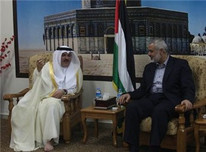
The Qatari government on Tuesday invited tenders for four construction projects, in the first stage of a $254 million project to rebuild the war-torn Gaza Strip.
Qatar's ambassador to Gaza Muhammad al-Imadi is heading a committee overseeing the work.
Consultants have been invited to submit designs for a city to be named after Sheikh Hamad Ben Khalifa al-Thani. The $30-million development will include 1,000 residential units in five-story apartment blocks, schools, stores, clinics, parks and entertainment facilities, the ambassador said in a statement.
Companies were also invited to bid for the repair of three major roads in the enclave. The 35-kilometer coastal highway al-Rashid Street will cost around $50 million to repair, and $18 million has been allocated to reconstruct the 10-kilometer al-Karama Street.
The 28-kilometer Salah Addin Street will be repaired first, at a cost of $60 million, as the plans and designs are ready, al-Imadi said.
In the coming days, consultants will be invited to bid for several agricultural projects, budgeted at $12.5 million.
Housing projects worth $32 million will also be announced this week to house needy families and to re-home those who were evicted for building on public land.
Qatar's ambassador to Gaza Muhammad al-Imadi is heading a committee overseeing the work.
Consultants have been invited to submit designs for a city to be named after Sheikh Hamad Ben Khalifa al-Thani. The $30-million development will include 1,000 residential units in five-story apartment blocks, schools, stores, clinics, parks and entertainment facilities, the ambassador said in a statement.
Companies were also invited to bid for the repair of three major roads in the enclave. The 35-kilometer coastal highway al-Rashid Street will cost around $50 million to repair, and $18 million has been allocated to reconstruct the 10-kilometer al-Karama Street.
The 28-kilometer Salah Addin Street will be repaired first, at a cost of $60 million, as the plans and designs are ready, al-Imadi said.
In the coming days, consultants will be invited to bid for several agricultural projects, budgeted at $12.5 million.
Housing projects worth $32 million will also be announced this week to house needy families and to re-home those who were evicted for building on public land.
20 sept 2012
UN envoy: PA state-building at risk amid deadlock
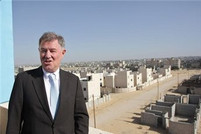
UN special coordinator for the peace process Robert Serry.
The Palestinian Authority's achievements in building the institutions of a future state are at risk due to political and economic deadlock, a UN envoy warned on Thursday.
"Amidst a fiscal crisis and related social unrest in the West Bank, the stakes are growing," UN special coordinator for the peace process Robert Serry said.
A report from his office, released ahead of a PA donor meeting in late September, called on donors to increase aid to the Palestinian Authority.
The UN report also stressed the need to reduce obstacles to Palestinian movement in the occupied West Bank, in order to facilitate private sector growth.
Areas of the West Bank areas under full Israeli control, known as Area C, are essential to a viable Palestinian state, the report said.
It noted a recent UN study warning that the Gaza Strip would not "liveable" by 2020 without urgent action to improve water sanitation, electricity, education, health and other services.
"We should all be concerned about Gaza’s future if there is no change to the current untenable situation," Serry said. He noted Israel had approved some construction projects in 449 houses and six schools operated by the UN.
The Gaza Strip is isolated by an Israeli land and sea blockade, despite the easing of some restrictions in mid-2010.
An International Monetary Fund report on Thursday said while the easing boosted Gaza's economy, growth has declined to 6 percent in the first quarter of 2012.
In the West Bank real GDP growth declined to 5 percent in 2011 and the first quarter of 2012, down from an annual average rate of 9 percent, the IMF said. Unemployment grew in both the West Bank and Gaza in 2012, the report added.
Another report issued before the donor meeting, from the World Bank, warned of a deepening fiscal crisis in the Palestinian economy, urging donors to act immediately.
Access to resources in Area C could play a significant role for the development of Palestinian industry in areas such as construction, telecommunications, agriculture and tourism, the report said.
The Palestinian Authority's achievements in building the institutions of a future state are at risk due to political and economic deadlock, a UN envoy warned on Thursday.
"Amidst a fiscal crisis and related social unrest in the West Bank, the stakes are growing," UN special coordinator for the peace process Robert Serry said.
A report from his office, released ahead of a PA donor meeting in late September, called on donors to increase aid to the Palestinian Authority.
The UN report also stressed the need to reduce obstacles to Palestinian movement in the occupied West Bank, in order to facilitate private sector growth.
Areas of the West Bank areas under full Israeli control, known as Area C, are essential to a viable Palestinian state, the report said.
It noted a recent UN study warning that the Gaza Strip would not "liveable" by 2020 without urgent action to improve water sanitation, electricity, education, health and other services.
"We should all be concerned about Gaza’s future if there is no change to the current untenable situation," Serry said. He noted Israel had approved some construction projects in 449 houses and six schools operated by the UN.
The Gaza Strip is isolated by an Israeli land and sea blockade, despite the easing of some restrictions in mid-2010.
An International Monetary Fund report on Thursday said while the easing boosted Gaza's economy, growth has declined to 6 percent in the first quarter of 2012.
In the West Bank real GDP growth declined to 5 percent in 2011 and the first quarter of 2012, down from an annual average rate of 9 percent, the IMF said. Unemployment grew in both the West Bank and Gaza in 2012, the report added.
Another report issued before the donor meeting, from the World Bank, warned of a deepening fiscal crisis in the Palestinian economy, urging donors to act immediately.
Access to resources in Area C could play a significant role for the development of Palestinian industry in areas such as construction, telecommunications, agriculture and tourism, the report said.
19 sept 2012
Concerning the Removal of Illegal Installation Near the Building of the Union of Contractors in Gaza
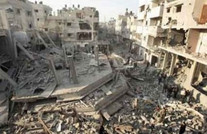
On 17th September 2012, The Land Authority in Gaza, supported by the Palestinian police, has started removing illegal installations owned by the Union of Contractors in Gaza. This process has been started just after finishing all needed legal requirements.
Concerning the union's claim that this process is illegal, The Land Authority would like to clarify that:
1. The 1700 m2 area of land under conflict was rent to the contractors union in 23.09.2008, knowing that this area was allocated to Gaza Municipality to be used for constructing a storm water collecting area. This project, unfortunately, was delayed due to siege and technical problems.
2. On 25.10.2010, The Land Authority informed the union that this rental is over, in a letter sent directly to Mr. Osama Kuhail, the president of the union, stating that the 1700 m2 land area lying in the piece of land number (726), parcel (229) in Tel-Elhawa district in Gaza should be evacuated within 15 days.
3. On 03.07.2012 the ministers council in Gaza decided to allocate this area for constructing a hospital instead of storm water collection area.
4. The facilities removed by the Land Authority are only few facilities of the union's properties extending on about 3 donums the union uses in the conflict area, including the 1700 m2 land.
5. On 29.08.2012, the union was asked to remove the illegal facilities on the mentioned land.
Finally, The Land Authority expresses its condemnation for the media campaign leaded by the union against the Land Authority, and insures that this process is done according to ministers council resolution of allocating this land for rehabilitation and physical therapy hospital .
Concerning the union's claim that this process is illegal, The Land Authority would like to clarify that:
1. The 1700 m2 area of land under conflict was rent to the contractors union in 23.09.2008, knowing that this area was allocated to Gaza Municipality to be used for constructing a storm water collecting area. This project, unfortunately, was delayed due to siege and technical problems.
2. On 25.10.2010, The Land Authority informed the union that this rental is over, in a letter sent directly to Mr. Osama Kuhail, the president of the union, stating that the 1700 m2 land area lying in the piece of land number (726), parcel (229) in Tel-Elhawa district in Gaza should be evacuated within 15 days.
3. On 03.07.2012 the ministers council in Gaza decided to allocate this area for constructing a hospital instead of storm water collection area.
4. The facilities removed by the Land Authority are only few facilities of the union's properties extending on about 3 donums the union uses in the conflict area, including the 1700 m2 land.
5. On 29.08.2012, the union was asked to remove the illegal facilities on the mentioned land.
Finally, The Land Authority expresses its condemnation for the media campaign leaded by the union against the Land Authority, and insures that this process is done according to ministers council resolution of allocating this land for rehabilitation and physical therapy hospital .
18 sept 2012
Qatari delegation to visit Gaza, discuss construction projects
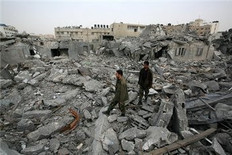
Hamas police officers walk on rubble of the central security headquarters and prison which was bombed and destroyed by Israeli air attacks in Gaza City in January 2009.
A delegation from Qatar will arrive in the Gaza Strip next week to discuss construction projects in the coastal enclave, a Gaza official said.
Minister of housing and public works in Gaza, Yousef Subhi al-Ghareez, said that the proposed construction projects would cost over $100 million.
A Qatari delegation headed by Muhammad Emadi will tour Gaza next week and review several projects, including the rehabilitation of main roads and other public infrastructure.
Israel restricts the import of construction material and equipment for private sector building under its land and sea blockade on Gaza, tightened in 2007 after Hamas seized power.
A delegation from Qatar will arrive in the Gaza Strip next week to discuss construction projects in the coastal enclave, a Gaza official said.
Minister of housing and public works in Gaza, Yousef Subhi al-Ghareez, said that the proposed construction projects would cost over $100 million.
A Qatari delegation headed by Muhammad Emadi will tour Gaza next week and review several projects, including the rehabilitation of main roads and other public infrastructure.
Israel restricts the import of construction material and equipment for private sector building under its land and sea blockade on Gaza, tightened in 2007 after Hamas seized power.
16 sept 2012
Israeli authorities 'order Hebron village to stop building'
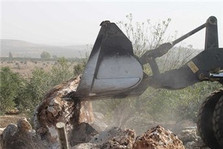
Israeli authorities ordered Palestinians to stop building two homes and a water well in the southern West Bank, a research group said.
The 100-square meter home of Mohammad Hussain Al-Omour, the two-storey home of Musa Mohammad Hussain and the water well belonging to Issa Jaber Al-Adra were all issued stop work orders, the Land Research Center said.
The buildings are in Deirat village, a community southeast of Hebron that lies in an area of the occupied West Bank under full Israeli civil and military control.
The 100-square meter home of Mohammad Hussain Al-Omour, the two-storey home of Musa Mohammad Hussain and the water well belonging to Issa Jaber Al-Adra were all issued stop work orders, the Land Research Center said.
The buildings are in Deirat village, a community southeast of Hebron that lies in an area of the occupied West Bank under full Israeli civil and military control.
28 aug 2012
Gaza authority levels land for Egypt free trade zone
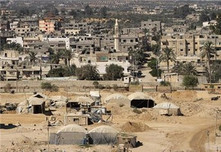
The entrances to smuggling tunnels are seen on the border between Egypt and the southern Gaza Strip, near Rafah August 8, 2012.
The land authority in Gaza began leveling ground on Tuesday to establish a free trade zone between Egypt and the Gaza Strip, an official said.
"The land authority has submitted 200 acres to the Economy Ministry to establish a trade zone between Egypt and the Gaza Strip, all located west of the Rafah crossing," land authority director Amal Shamali told Ma'an.
"An area of 40 acres will be within the commercial crossing in the area near the Rafah crossing, while 160 acres will be allocated to the free market. Furthermore, the free market is one kilometer wide and two kilometers in length mostly on government land, while small parts are from citizens' land," he added.
Some landowners have reportedly objected to their land being used for the project.
With a free trade zone, Gaza could potentially import and export goods and raw materials through the Egyptian seaport of el-Arish without paying custom duties to Egyptian authorities, IRIN says.
Publicly and in discussions with Egyptian officials, Hamas has been pushing to use the Rafah border crossing between Egypt and Gaza for commercial trade.
The land authority in Gaza began leveling ground on Tuesday to establish a free trade zone between Egypt and the Gaza Strip, an official said.
"The land authority has submitted 200 acres to the Economy Ministry to establish a trade zone between Egypt and the Gaza Strip, all located west of the Rafah crossing," land authority director Amal Shamali told Ma'an.
"An area of 40 acres will be within the commercial crossing in the area near the Rafah crossing, while 160 acres will be allocated to the free market. Furthermore, the free market is one kilometer wide and two kilometers in length mostly on government land, while small parts are from citizens' land," he added.
Some landowners have reportedly objected to their land being used for the project.
With a free trade zone, Gaza could potentially import and export goods and raw materials through the Egyptian seaport of el-Arish without paying custom duties to Egyptian authorities, IRIN says.
Publicly and in discussions with Egyptian officials, Hamas has been pushing to use the Rafah border crossing between Egypt and Gaza for commercial trade.
25 aug 2012
Official: Qatar to open office to oversee Gaza reconstruction
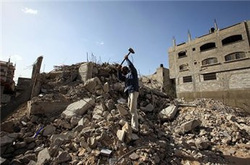
Many buildings are still in rubble three years since Cast Lead
Qatar will open an office in Gaza to oversee its reconstruction projects in the enclave, an official in Gaza said Friday.
Minister of Public Works and Housing Yousif al-Mansi said a Qatari delegation had agreed to start the first phase of a $224 million project during a visit to Gaza in June.
"We're waiting for the delegation to come back in the next week or two to open a Qatari office in Gaza to start signing contracts and start the reconstruction projects," al-Mansi told Ma'an.
Initially, reconstruction efforts will focus on infrastructure and buildings for the ministries of health and agriculture, the minister said.
"There are Qatari-Egyptian-Palestinian communications to allow material through the Rafah crossing."
The Hamas minister stressed that the Ramallah-based Palestinian Authority was not involved in the project.
Many buildings that were damaged in Israel's 2008-2009 assault on the Gaza Strip remain in rubble due to restrictions on construction materials entering the territory.
Qatar will open an office in Gaza to oversee its reconstruction projects in the enclave, an official in Gaza said Friday.
Minister of Public Works and Housing Yousif al-Mansi said a Qatari delegation had agreed to start the first phase of a $224 million project during a visit to Gaza in June.
"We're waiting for the delegation to come back in the next week or two to open a Qatari office in Gaza to start signing contracts and start the reconstruction projects," al-Mansi told Ma'an.
Initially, reconstruction efforts will focus on infrastructure and buildings for the ministries of health and agriculture, the minister said.
"There are Qatari-Egyptian-Palestinian communications to allow material through the Rafah crossing."
The Hamas minister stressed that the Ramallah-based Palestinian Authority was not involved in the project.
Many buildings that were damaged in Israel's 2008-2009 assault on the Gaza Strip remain in rubble due to restrictions on construction materials entering the territory.
